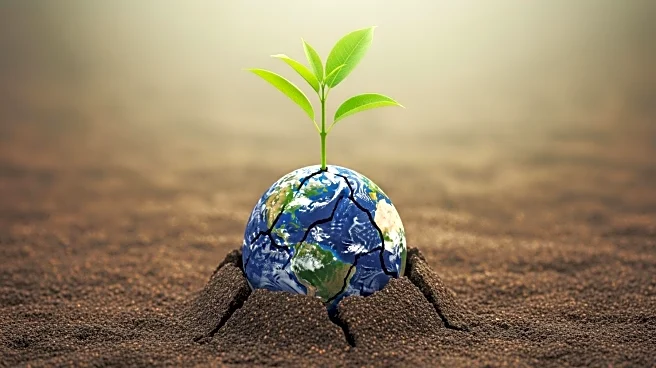What's Happening?
Recent research highlights the risks posed by modern agricultural practices to the resilience of global soils, which are crucial for food production and environmental stability. The study, led by Dr. Alison Carswell from Rothamsted Research, emphasizes that intensive farming methods such as plowing, fertilization, and irrigation, while beneficial for short-term yield increases, degrade soil quality over time. This degradation reduces the soil's ability to recover from environmental stresses like droughts and floods, leading to issues such as erosion, salinization, and pest infestations. The study, published in NPJ Sustainable Agriculture, identifies erosion from over-plowing and deforestation as the most severe threats, alongside pollution and soil compaction from livestock operations.
Why It's Important?
The decline in soil resilience poses significant threats to global food security, biodiversity, and climate stability. Soils are foundational to 95% of food production and store more carbon than all forests combined. As soil health deteriorates, the risk of irreversible productivity collapse increases, potentially disrupting food and trade networks worldwide. This is particularly concerning as global food demand rises, especially in regions like sub-Saharan Africa and Southeast Asia. The study calls for a reevaluation of land management practices to balance immediate agricultural productivity with long-term soil health, warning that failure to address these issues could lead to widespread instability.
What's Next?
The study suggests that breaking the cycle of soil degradation is possible through alternative practices such as conservation tillage and integrated pest management. These methods can help maintain soil resilience, though they require careful balancing of productivity and long-term sustainability. The authors urge a shift in focus from short-term yield gains to strategies that ensure soil health for future generations. This approach may involve trade-offs but is essential to prevent tipping points in agricultural systems that could lead to irreversible damage.
Beyond the Headlines
The research underscores the ethical and environmental responsibility of rethinking agricultural practices to safeguard soil health. It highlights the need for global cooperation and policy changes to promote sustainable farming methods. The study also points to the potential for innovative solutions that integrate traditional practices with modern technology to enhance soil resilience without compromising productivity.










